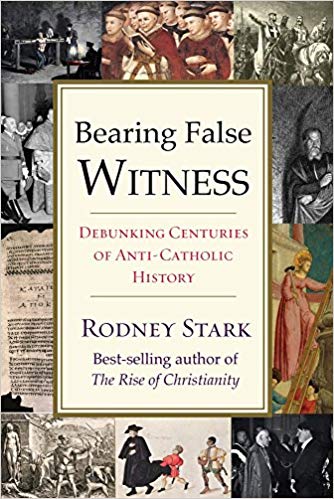You bear false witness. The SDA is obsessed with Catholic bashing, particularly with exaggerated histories as you have just proved. TODAY, nobody accepts Auquinas' outdated teachings. He was addressing the heresiarchs of his day, that were a threat to society. You guys always leave out historical context to paint Aquinas as a blood thirsty monster. It's not the 12th century.
Presentism: In literary and historical analysis, presentism is the anachronistic introduction of present-day ideas and perspectives into depictions or interpretations of the past. Some modern historians seek to avoid presentism in their work because they consider it a form of cultural bias, and believe it creates a distorted understanding of their subject matter. The practice of presentism is regarded by some as a common fallacy when writing about the past. (wiki)
As we all know and as many of our well established textbooks have argued for decades, the Inquisition was one of the most frightening and bloody chapters in Western history, Pope Pius XII was anti-Semitic and rightfully called “Hitler’s Pope,” the Dark Ages were a stunting of the progress of knowledge to be redeemed only by the secular spirit of the Enlightenment, and the religious Crusades were an early example of the rapacious Western thirst for riches and power.
But what if these long held beliefs were all wrong?
In this stunning, powerful, and ultimately persuasive book, Rodney Stark, one of the most highly regarded sociologists of religion and bestselling author of
The Rise of Christianity (HarperSanFrancisco 1997) (he is NOT a Catholic) argues that some of our most firmly held ideas about history, ideas that paint the Catholic Church in the least positive light are, in fact, fiction. Why have we held these wrongheaded ideas so strongly and for so long? And if our beliefs are wrong, what, in fact, is the truth?
In each chapter, Stark takes on a well-established anti-Catholic myth, gives a fascinating history of how each myth became the conventional wisdom, and presents a startling picture of the real truth. For example,
- Instead of the Spanish Inquisition being an anomaly of torture and murder of innocent people persecuted for “imaginary” crimes such as witchcraft and blasphemy, Stark argues that not only did the Spanish Inquisition spill very little blood, but it was a major force in support of moderation and justice.
- Instead of Pope Pius XII being apathetic or even helpful to the Nazi movement, such as to merit the title, “Hitler’s Pope,” Stark shows that the campaign to link Pope Pius XII to Hitler was initiated by the Soviet Union, presumably in hopes of neutralizing the Vatican in post-World War II affairs. Pope Pius XII was widely praised for his vigorous and devoted efforts to saving Jewish lives during the war.
- Instead of the Dark Ages being understood as a millennium of ignorance and backwardness inspired by the Catholic Church’s power, Stark argues that the whole notion of the “Dark Ages” was an act of pride perpetuated by anti-religious intellectuals who were determined to claim that theirs was the era of “Enlightenment.”
In the end, readers will not only have a more accurate history of the Catholic Church, they will come to understand why it became unfairly maligned for so long.
Bearing False Witness is a compelling and sobering account of how
egotism and ideology often work together to give us a false truth.
Backlit is too proud to be corrected.
One book doesn't eradicate the bloody history of Papal despotism in Europe.
Aquinas merely continued that which began earlier. Others set the mood. He established a principle, a precedent, by which the church practised and operated to this day. The basic ethos of papal supremacy, the concept that the Pope rules the whole world both in the secular and religious spheres, is as ancient as it is unbiblical. According to your own teachings, Popes don't make stuff up. They merely exercise what has gone on before.
You would have us believe that the inquisitions, held throughout Europe for centuries and elsewhere where Jesuits thought it appropriate, as an Goa India) were inquiries held only toward the faithfulness or otherwise against Catholics? The torture chambers underneath the churches, cathedrals and castles throughout Europe (you can still visit many of them today if you have a mind that can handle the obscene) were there only to torture Catholics, and this process wasn't one of persecution, but excommunication right? And that this practice was only at the instigation of evil individuals and not church policy I suppose.
And of course all this terrible history written of by so many is nothing more than a sinister plot by anti Catholics to, ummm, why have so many written of those things again?
You speak of this concept of "presentism". I find that curious. Please explain how that concept applied to eye witness accounts and testimony of the actual victims suffering under those persecutions. Were they being melodramatic and unsympathetic to the context of the times in which they were living?
Does "presentism", apply to the more recent teachings of the Catholic Church that reflect word by word, the infallible teachings of predecessors? How does that work? For example, are the teachings of Trent now discarded due to cultural bias? Or are they still an infallible depiction of papal supremacy and repudiation of individual religious conscience as taught and practiced for 1500 years?
Are we lying, or is the Adventist church exaggerating when we quote Pius IX as saying that people have no right to suggest the following...
23. Roman pontiffs and ecumenical councils have wandered outside the limits of their powers, have usurped the rights of princes, and have even erred in defining matters of faith and morals. — Damnatio “Multiplices inter,” June 10, 1851.
Are we lying and the Adventist church exaggerating when we quote Pius IX as saying that being have no right to suggest that
24. The Church has not the power of using force, ( and of course this has nothing to do with freedom of conscience) nor has she any temporal power, direct or indirect. — ( and such force in the temporal sphere is denied by you and others here in this forum when you claim only the state used torture and correction and the death sentence.)Apostolic Letter “Ad Apostolicae,” Aug. 22, 1851.
Are we lying, or is the Adventist church exaggerating when we quote Pius IX as saying that people have no right to suggest the church wrong to view...
Pests of this kind (Bible societies included so again, a declaration against religious liberty) are frequently reprobated in the severest terms in the Encyclical “Qui pluribus,” Nov. 9, 1846, Allocution “Quibus quantisque,” April 20, 1849, Encyclical “Noscitis et nobiscum,” Dec. 8, 1849, Allocution “Singulari quadam,” Dec. 9, 1854, Encyclical “Quanto conficiamur,” Aug. 10, 1863.
These ideas I am talking about are not frivolous attacks or anti Catholic vitriol as you would like to make out. There are genuine concerns for those liberties as set out in state sponsored constitutions that guarantee the rights of individuals to worship according to conscience. Your arguments and denials regarding Catholic history and the continuing tightly held rigid canonical concepts and precepts going back many centuries, do absolutely nothing toward offering any reassurance. Catholic belligerence and accusing us of being liars etc when we bring these matters into the conversation is further evidence for our caution and suspicion.
Papal supremacy and the officially held self appointed right of the Catholic Church to rule and reign as sovereign over the whole earth in the place of God is nothing more nor less than a usurpation of authority by the church over Christ. The expectation and demand, with legalized penalties for "rebelliousness", by which term the Protestant reformation is still considered, that all, whether believer or not, ought to be in submission to papal authority is not an old concept that we look to with cultural bias and your word, "presentism". It isn't Catholic bashing. It isn't anti Catholic vitriol. We merely acknowledge your own church's tightly held ambitions and the witness of history that testifies to her willingness to go to any lengths to accomplish them..



